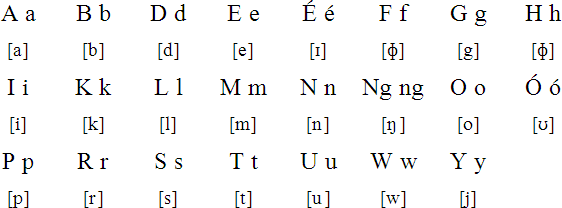Siar is a Western Oceanic language spoken in New Ireland Province in Papua New Guinea by about 2,500 people (in 2005). Specifically at the southern end of the province on east and west coasts, and on nearby islands. There are also some Siar speakers in other parts of Papua New Guinea.
The language is also known as Siar-Lak, Lak, Lamassa or Likkilikki, and the native name is ep warwar anun dat, which means 'our language'.
Children are educated in Siar in some schools for the first three years. In other schools education is in English.

[ɸ] is written h at the end of words, f elsewhere.
Download a alphabet chart for Siar (Excel)
I tik ep barsan, ep rise-n i Tagorman, i kés ting o-n i tik a pukun, i sen masik. Ting o-n ep lakman ngasi-n, kai kakaruk kól anu-n, ap i kés masik tar, i sen masik.
One man, his name is Tagorman lived at a place, by himself. There at his place he had many chickens, and he lived alone, he by himself.
Source: Siar-Lak Grammar Essentials
Details of Siar provided by Michael Peter Füstumum
Information about Siar | Numbers
Information about Siar
https://en.wikipedia.org/wiki/Siar-Lak_language
http://www.ethnologue.com/18/language/sjr
http://www-01.sil.org/pacific/png/pubs/0000393/Siar%20Grammar%20Essentials.pdf
http://www-01.sil.org/pacific/png/show_lang_entry.asp?id=sjr
Adzera, Ahamb, Äiwoo, Aneityum, Apma, Araki, Are, ’Auhelawa, Avava, Babatana, Bariai, Bola, Big Numbas, Buhutu, Bwaidoka, Caac, Cheke Holo, Dorig, Hiri Motu, Hiw, Hoava, Kakabai, Kaninuwa, Kokota, Kove, Kurti, Lakon, Lehali, Lenakel, Lewo, Lote, Lo-Toga, Löyöp, Manam, Marovo, Maskelynes, Mato, Mavea, Mono-Alu, Motu, Mussau-Emira, Mwotlap, Nafsan, Nahavaq, Namakura, Nanggu, Nduke, Neve‘ei, Neverver, Ninde, North Efate, Nume, Paamese, Papapana, Raga, Rotuman, Roviana, Sa, Sakao, Saliba, Siar, Sio, Ske, Sobei, Sursurunga, Tamambo, Tami, Teanu, Tigak, Tirax, Tolai, Touo, Ubir, Ughele, Uneapa, Vatlongos, Vitu, Vurës, Western Fijian, Yabem, Yapese
Languages written with the Latin alphabet
Page last modified: 17.11.22
[top]
You can support this site by Buying Me A Coffee, and if you like what you see on this page, you can use the buttons below to share it with people you know.

If you like this site and find it useful, you can support it by making a donation via PayPal or Patreon, or by contributing in other ways. Omniglot is how I make my living.
Note: all links on this site to Amazon.com, Amazon.co.uk
and Amazon.fr
are affiliate links. This means I earn a commission if you click on any of them and buy something. So by clicking on these links you can help to support this site.
[top]